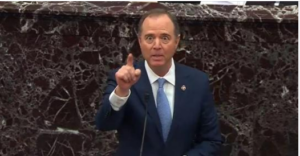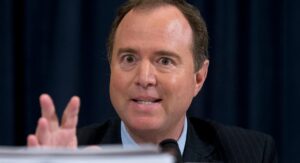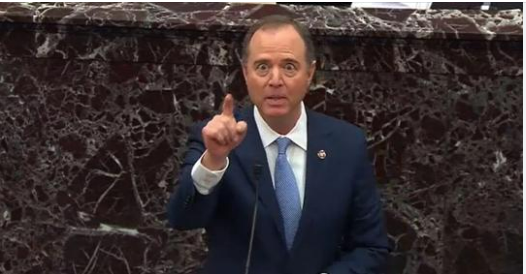Senator-elect Adam Schiff of California recently appeared on CNN’s State of the Union, where he was defending his earlier allegations of Russian meddling in the 2016 election and of cooperation between the Russian government and the campaign of then-candidate Donald Trump.
Schiff stuck to his position in spite of time and the results of Special Counsel Robert Mueller’s inquiry, which in the end did not provide solid proof of such collaboration. CNN host Jake Tapper conducted the interview, which focused on Schiff’s contentious remarks regarding the Trump-Russia investigation and his status as the House Intelligence Committee chairman.

Speaking directly to Schiff, Tapper—who has frequently been a scathing critic of political leaders—discussed the House censure resolution that had been passed the previous year. Schiff’s handling of the Russian meddling inquiry and his public claims regarding the proof of collusion were attacked in the resolution. Schiff’s involvement in spreading the story of Russian interference and cooperation throughout Trump’s presidency was explicitly criticized in the censure motion.
Tapper cited the censure and Mueller’s investigation’s findings, which, although they showed Russian meddling, did not prove the cooperation Schiff had highlighted time and time again. Tapper’s inquiry presented a challenging question: Did Schiff reflect on or feel remorse for his part in possibly escalating partisan tensions by making statements that the investigation eventually failed to support?

Schiff’s reaction was noteworthy because it persisted in defending the investigation’s more general findings and the data that, in his opinion, still raised serious questions regarding Russian meddling and influence in the 2016 race. Schiff maintained that the seriousness of the situation demanded ongoing investigation even in the absence of proof of criminal conspiracy or cooperation between Trump’s campaign and Russia.
Schiff reiterated his earlier position that the Trump campaign had dubious interactions with Russian officials, even if such contacts did not satisfy the legal threshold for cooperation, saying, “I still believe there was ample evidence of Russian interference.”
Schiff also justified his stance on the issue by placing it in the larger framework of national security issues, arguing that the possibility of foreign interference in US elections was a danger that should never be disregarded. He said that even while
Mueller did not discover any concrete proof of criminal cooperation, the inquiry turned up enough troubling exchanges and actions to warrant further inquiries and monitoring of the Trump campaign’s election-related operations. Schiff has long been a vocal opponent of Trump, and throughout the Trump administration, his emphasis on the Russia conspiracy storyline remained a fundamental component of his political persona.
The wider question raised by Tapper was whether Schiff’s outspoken position on the collusion issue had aided in the ascent of political dissidents within the Republican Party, such as Representative Matt Gaetz of Florida and Robert F. Kennedy Jr., who were both contentiously appointed to Trump’s cabinet at the time. Tapper said that these individuals had drawn national attention due to their frequently aggressive statements and populist inclinations, which some detractors believed were made possible by the polarizing political environment.
Schiff did not apologize for his part in addressing what he saw as a grave danger to American democracy. Rather, he reaffirmed his conviction that the claims of foreign meddling in American elections were too significant to dismiss or minimize, regardless of the Mueller report’s findings. Schiff stressed that his dedication to looking into Russian meddling in the election was always based on defending American democracy, and that even though the investigation may not have resulted in Trump being charged with a crime, it did uncover concerning patterns of conduct that needed to be brought to the public’s notice.
Tapper and Schiff’s conversation brought to light the stark party differences that still exist in American politics, particularly in the wake of the Trump presidency. Schiff’s refusal to back down from his previous actions in the face of inconclusive evidence highlights the political difficulties that still exist today. Many Republicans consider Schiff’s remarks to be an overreach, a narrative that fueled the division of the Trump years, while other Democrats still see him as a hero for his attempts to hold Trump accountable.
Schiff’s opinions on election security, Russian meddling, and his involvement in looking into Trump’s ties to Russia are likely to continue to influence his political image as he gets ready to take on his new position as a U.S. Senator. The persistent debate surrounding the probe and the more general issue of how America should handle foreign influence in its elections are brought to light by his continued defense of the Trump-Russia collusion story. It remains to be seen if his unwavering stance would help him gain more support or exacerbate partisan divisions.
